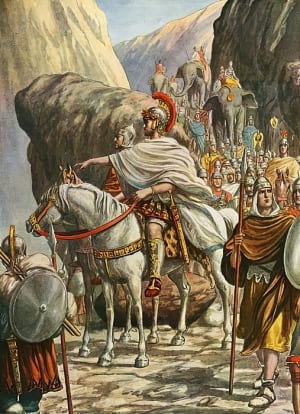18.12.218 BC. Second Punic War
Categories: Years of war and revolution , Calendar
 The Roman Empire scored a great triumph when it defeated Hannibal and his army, even though the Carthaginian warlord took them by surprise. With his army he managed to cross the Alps. After their victory in the Second Punic War, the Romans spread their power over most of the Mediterranean world.
The Roman Empire scored a great triumph when it defeated Hannibal and his army, even though the Carthaginian warlord took them by surprise. With his army he managed to cross the Alps. After their victory in the Second Punic War, the Romans spread their power over most of the Mediterranean world.
The Second Punic War broke out over Hispania. The leadership of the Phoenician cities in the Iberian Peninsula, together with influence with the local hinterland, had long been the basis of all Carthaginian great power politics. The Carthaginians used Iberian mercenaries to fight their wars, Iberian gold, silverbronze and other metals to pay and equip their soldiers and sailors. Iberian timber was then used to build their ships.
After the end of the First Punic War, they attempted to expand their influence on the peninsula and improve their access to its rich resources. In 237 BC, Hamilcar Barkas, a former Carthaginian warlord in Sicily, landed in Hispania. From then on, he regularly conducted military operations there and expanded Carthage's power until his death in 229 BC. He was then succeeded by Hasdrubal, his adopted son, who ruled and undertook military campaigns until he too died in 221 BC.
After his death, Hamilcar's own son Hannibal Barkas became commander of the Carthaginians in Hispania. "The rise of Carthage created the conditions for a new war with Rome. The diplomatic activities behind its outbreak are very obscure, mainly because our sources are pro-Roman and anti-Carthaginian and tend to show Hasdrubal and especially Hannibal in a bad light," write the authors of A History of the Roman Empire.
Strained relations persisted for several years until disagreements escalated into the so-called Second Punic War in 218 BC. Hannibal then set out from southern Hispania, where his army was concentrated in southern Carthage. He did not choose the sea route, but decided to cross the Alps, invade Upper Italy and from there challenge the Roman Empire to a decisive battle.
"Information on the strength of his army varies. Some sources give 38,000, others eight thousand less. Roughly two-thirds were to be Africans, one-third Hispanic warriors. But supplying such a large army, moving for many weeks in extremely difficultterrain presented a serious problem, the mastery of which was a masterly logistical feat. Supplies were running thin and the elephants would almost starve to death," Hans-Dieter Otto writes in Shocking Victory: The Most Surprising Upsets in the History of Warfare.
The snow masses they encountered also played a role. They buried almost half the army. When Hannibal reached the Po Plain, the Romans were stunned. They hadn't counted on such an invasion from the north. But the Romans eventually won, and their power spread across much of the Mediterranean world.
Sources:
Collective of Authors, History of the Roman Empire
Hans-Dieter Otto, Shocking victories: the most surprising reversals in the history of warfare
www.meisterdrucke.com
The article is included in categories: